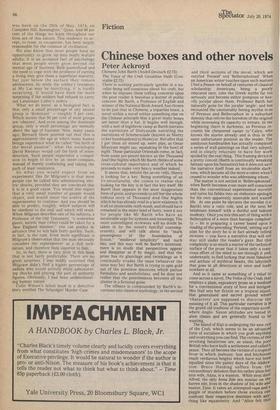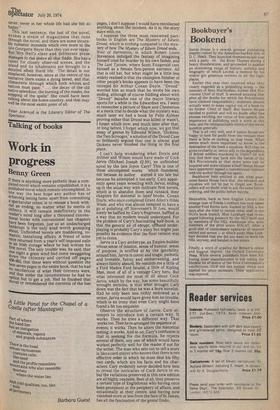Chinese boxes and other novels
Peter Ackroyd
Chimera John Barth (Andre Deutsch £2.75) The Voice of the Crab Geraldine Halls (Constable £2.75) There is nothing particularly ignoble in a novelist being self-conscious about his craft, but when he imposes these trifling concerns upon the poor reader it becomes a matter of public concern. Mr Barth, a Professor of English and winner of the National Book Award, has chosen to do just that in Chimera, a tripartite beast, a novel within a novel within something else on the Chinese principle that a great many boxes are better than a hat. It begins well enough, with a sort of highbrow camp as Barth narrates the narrations of Dunyazade narrating the narrations of Scheherazade (known as Sherry to her handmaidens) to Shahryar. But after that I got them all mixed up, mere pips, as Omar Khayyam might say, squeaking in the bowl of night. These particular Orientals come, in fact, from some pot-pourri known as the Thousand And One Nights which Mr.Barth thinks of some cross-cultural importance and of which he proceeds to make very heavy weather indeed.
It seems that, behind the seven veils, Sherry is looking for a key. Being something of an Ur-structuralist, she comes to realise that looking for the key is in fact the key itself. Mr Barth then appears in the most inapproriate form of genie, and proceeds to tell her the whole tedious story of Thousand And One Nights which he has already read in a later existence. It is all an intolerable mish-mash, and should have remained in the misty land of faery, were it not for people like Mr Barth who have an intolerable urge for systems and meanings. The more unintelligent reviewers will no doubt be taken in by the novel's fanciful contemporaneity, and will talk about its "stark presentment of the boundaries of fiction," "medieval simplicity" and such like, and this may well be Barth's intention: there is no doubt that perspectives appear and disappear as if by magic, and that the prose has its glancings and twinklings as it continually evades the issue (whatever the issue may be). But Barth is trying to spin gold out of the pointless questions which pursue formalists and aestheticians, and he does not realise that the pointlessness becomes all the plainer in a fictional guise.
The offence is compounded by Barth's incursions into classical mythology, in the second and third sections of the novel, which are entitled `Perseid' and 'Bellerophoniad'. When an American writer touches upon such matters I feel a frisson on behalf of centuries of classical scholarship; Americans, being a poorly educated race, take the Greek myths far too seriously and become either pompous or heavily jocular about them. Professor Barth has naturally gone for the jocular 'angle', and has recounted the unutterably boring mythic lives of Perseus and Bellerophon in a suburban demotic that relives the boredom of the original while increasing its capacity to irritate. In the beginning there is darkness, as Perseus re counts his chequered career to' Calyx, who knows the stories already and is thus in the same unfortunate position as the reader. The assiduous handmaiden has actually completed a series of wall-paintings on that very subject, and is clearly reluctant to have her work spoiled by the real thing. This framing device is a pretty conceit (Barth is continually wreaking fantasy upon his fantastics) but it does not save the narrative itself from an intolerable slackness, which became all the more evident when 1 ceased to wonder who was addressing whom.
The matter is not settled in 'Bellerophoniad', when Barth becomes even more self-conscious than the conventional experimental novelist and turns his fables into an elaborate apologia for his own apparently miserable and wasted life. At one point he elevates the novelist (i.e. Barth) into a vatic role, and at the next he belabours himself with a dutiful and tedious modesty. Once you mix this sort of thing with a Bellerophon of a more than baroque complexity — he is preparing a career based upon a reading of the preceding 'Perseid,' setting out a plan for the story he is in fact already telling etcetera — you have a narrative that will not stay still under the reader's gaze. But this complexity is so much a matter of the technical surface of the prose that it takes only a conscious effort of the mind to see through it and, underneath, to find lurking that most fabulous and archaic of mythical beasts, the labyrinth that goes in all directions at once and leads nowhere at all.
And so it came as something of a relief to come across a novel, The Voice of the Crab, that employs a plain, expository prose as a mediurn for a conventional story of love and intrigue. Mrs Hall sets her fiction on a tropical island, that generalised and sacred ground where 'characters' are supposed to discover the meaning of it all. This particular narrative is in the grand old tradition of the expatriate novel, where AngloSaxon attitudes are tested in alien climes and are generally found to be wanting.
The island of Kipi is undergoing the new cult of the Crab, which seems to be an advanced form of socialism in which you grab anything and everything you can find. The victims of this • revolting fanaticism are, as usual, the poor British who have built a settlement and called it peace. They all become the victims of a tropical fever in which jealousy, lust and bitchiness reach verdurous heights which have not been equalled since the palmy days of the Abdication. Bruce Harding suffers from the extraordinary delusion that his rather plain but nice wife, Anna, is a wanton. While next door Alfred, the only bona fide sex maniac on the barren isle, lives in the shadow of his wife and master, Elsie. It takes an attempted rape and 3 gaggle of murders before these exotics can confront their respective destinies with anr thing like equanimity. And "Alice felt that
never, never in her whole life had she felt so happy."
This last sentence, the last of the novel, evokes a strain of magazinese that runs through the novel, and there are some incurably romantic moments which owe more to the late Georgette Heyer than they can ever repay. But Mrs Hall's clear and deliberate prose manages to rise above all that fiddle. She has a talent for closely observed scenes, and the island and its inhabitants are brought to a detailed albeit florid life. The detail is not misplaced, however, since at the centre of the narrative there exists a dying breed, and that climacteric through which both whites and natives must pass: " ... the decay of the old native splendour, the burning of the masks, the stopping of the spells" She could have been talking about the home-country, and that may well be the most exotic point of all.
Peter Achroyd is the Literary Editor of The Spectator.



































 Previous page
Previous page